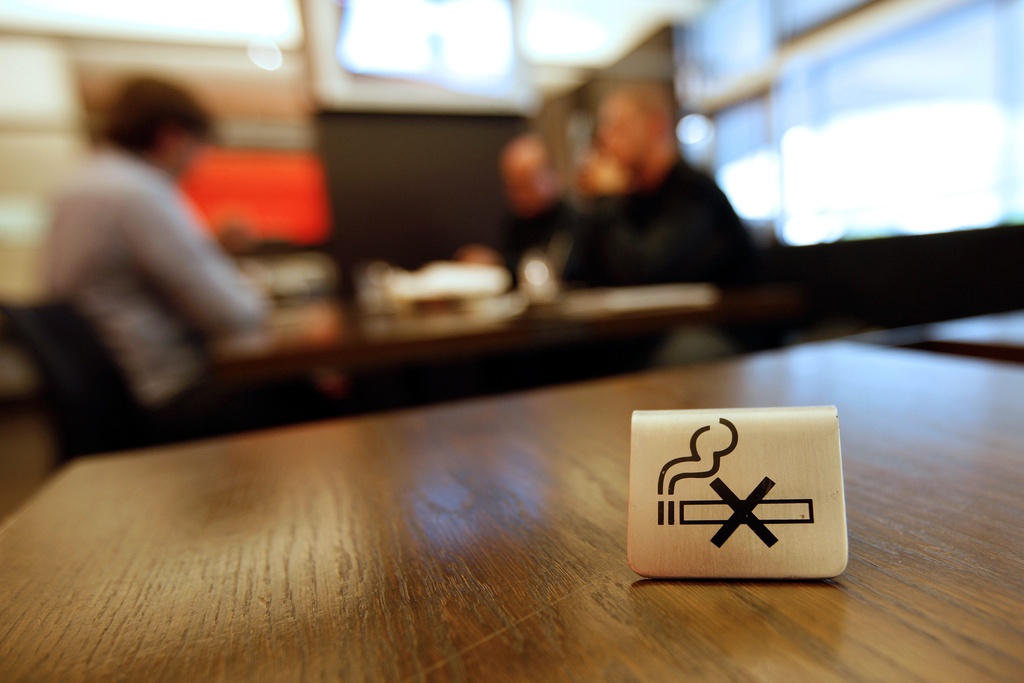Tobacco ruling has a financial side

Following a Federal Court ruling, the Federal Health Office has concluded that nicotine addiction can be considered an illness.
Basic compulsory insurance, which currently does not reimburse any anti-tobacco medication, will have to pay up. The health office made its decision on August 9. Criteria have yet to be fixed.
“This ruling is historical because it gives prevention the right place,” Jean-Charles Rielle, a doctor at the Information Centre for Tobacco Addiction Prevention in Geneva (CIPRET), told public radio on August 9.
Rielle, also a parliamentarian, welcomed the “financial boost” for smokers who want to give up.
On August 4 the Federal Court underlined that alcohol and heroin addiction could be considered an illness and that “under certain conditions” so could dependence on nicotine. In this case, insurance companies would have to reimburse medicines to treat smoking addiction.
The court partially agreed with drug maker Pfizer which wanted its Champix (or Chantrix) medication included in the list of medicines reimbursed by basic insurance.
Pfizer’s demand had previously been dismissed by the health office in 2008 and then in 2010 by the Federal Administrative Court. The federal court ruling meant the health office had to reconsider its position, which it has since August 9, confirmed the health office’s spokesman Daniel Dauwalder.
“Negative message”
For their part, health insurance companies have denounced the “negative message.”
“We only cover risk of illness and not prevention, which is not a risk. Prevention is down to individual responsibility and can’t be carried by everyone. This would be putting all types of behaviour under state control,” explained Yves Seydoux, spokesman for Groupe Mutuel.
But if alcohol addiction is considered an illness, why not tobacco dependency? Seydoux argues that tobacco addiction’s effects are not as great as those for alcohol.
Addiction to the bottle can “affect behaviour and create sometimes grave side effects, whereas it’s the consequences of tobacco addiction that are harmful to health”, he said. “It’s a question of free choice.”
Jacques de Haller, president of the Swiss Medical Association, does not quite agree. “From a medical point of view the two pathologies are different, but both are a dependency.”
“A smoker is addicted to tobacco which makes him lose his free will and can considerably shorten his life,” he said. In addition, there is “the real problem of passive tobacco addiction”.
Economic side
The health office must now decide when smoking addiction can be considered an illness through the treatment needed. Then it must pronounce on the second fundamental factor: the economic side of the treatment.
For de Haller this latter point makes the federal court’s ruling a positive one.
“The issue of non-recognised treatments by insurance companies affects those who need it the most – the lower economic classes – who are already penalised on a social level,” he said.
CIPRET says Champix can double the chances of heavy smokers giving up in three months. But Gianfranco Domenighetti, professor of health economics at Lugano University, warns that the controversial medication needs to be well tolerated.
“According to a Canadian study, this medicine increases cardiovascular risk by 73 per cent,” he said.
Tolerance and effectiveness issues have also been raised for other treatments such as nicotine substitutes or Zyban, an antidepressant used against addiction. But most of all, according to de Haller, “their effectiveness is not 100 per cent guaranteed”.
Other measures?
Seydoux hopes that the federal court’s ruling will be applied “rigorously”.
“The health office has enough room for manoeuvre to ensure that a free market does not develop and that the notion of individual responsibility over tobacco’s consequences remains in people’s minds,” he said.
Some voices, notably in parliament, have suggested that anti-smoking drugs should only be reimbursed if the treatment is successful. De Haller is sceptical about “making people pay in relation to the therapy’s success, when the effectiveness is not 100 per cent guaranteed”.
Do insurance companies intend to penalise smokers by raising premiums? “No, it’s impossible to ‘police’ people. Society has to accept deviances [from the norm] and that it can only curb the consequences of the deviances,” Seydoux said.
De Haller concludes that the solution is in any case “more political than health-based”.
“The most efficient measure is increasing the price of a packet of cigarettes. Each time, the number of smokers drops,” he said.
29 per cent of the Swiss population aged 14-65 smoke. The proportion of smokers is highest among those aged 20-24.
About 8,300 people die from tobacco consumption in Switzerland annually.
There are around 16,000 cases of disability attributable to smoking.
The consumption of tobacco costs the Swiss economy SFr10 billion a year (SFr1.2 billion on medical treatment, SFr3.8 billion on invalidity costs, loss of quality of life is estimated at SFr5 billion). Income from tax on tobacco amounts to just over SFr2 billion a year.
In Switzerland, 20 cigarettes currently cost SFr7.40 ($9.30).
(source: Federal Health Office’s National Programme Tobacco 2008-2012)
There is no safe level of second-hand tobacco smoke. Smoke-free laws protect the health of non-smokers, are popular, do not harm business and encourage smokers to quit.
Second-hand smoke causes 600,000 premature deaths a year globally, of whom around 1,000 are in Switzerland.
Almost half of children – whose organs are damaged by passive smoke more than adults – regularly breathe air polluted by tobacco smoke. In 2004, children accounted for 28% of the global deaths attributable to second-hand smoke.
In adults, second-hand smoke causes serious cardiovascular and respiratory diseases, including coronary heart disease and lung cancer. In infants, it causes sudden death. In pregnant women, it causes low birth weight.
(source: WHO and Federal Health Office)
(Translated from French by Isobel Leybold-Johnson)

In compliance with the JTI standards
More: SWI swissinfo.ch certified by the Journalism Trust Initiative















You can find an overview of ongoing debates with our journalists here . Please join us!
If you want to start a conversation about a topic raised in this article or want to report factual errors, email us at english@swissinfo.ch.